Forum Home > GMAT > Quantitative > Problem Solving (PS)
Events & Promotions
| Last visit was: 26 Jul 2024, 23:57 |
It is currently 26 Jul 2024, 23:57 |

Customized
for You
Track
Your Progress
Practice
Pays
08:30 AM EDT
-08:30 AM EDT
08:30 AM PDT
-09:30 AM PDT
09:55 AM PDT
-11:00 AM PDT
08:00 PM PDT
-09:00 PM PDT
05:55 AM PDT
-12:30 PM PDT
07:00 PM IST
-08:00 PM IST
09:00 PM IST
-10:00 PM IST
| FROM Stacy Blackman Consulting Blog: Do This, Not That, if You’re Reapplying to Business School |
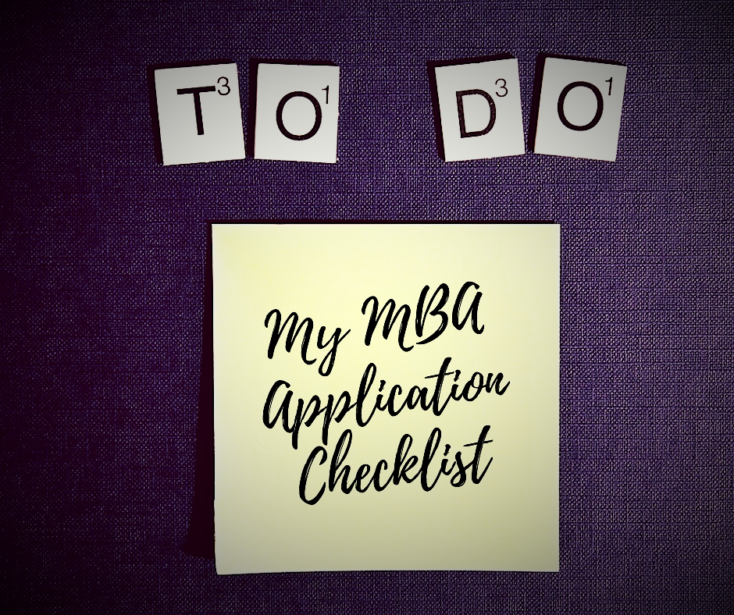 Many business schools, even the most elite and well-ranked ones, welcome re-applicants. Reapplying shows that you are very serious about your interest in the program, as this Tuck School blog post affirms. The best way to approach the process when you’re reapplying to business school is to highlight how you have improved your candidacy. Take a closer look at the following aspects of the MBA application package to determine where you should focus your energies to improve your odds next time around. Decide How Many and Which Programs to Target If you received multiple dings in your first application attempt, add new programs next time you’re reapplying to business school. You might have applied to ones that didn’t match up well with your profile. Make sure your focus is on fit over brand strength, and match your preferred learning style to the school’s instruction style.  Do: Apply to at least four schools to maximize your chances of success. These programs should represent varying levels of competitiveness. Don’t: Apply to too many schools – usually six or more – believing that hedging your bets in this way will guarantee admission somewhere. While that strategy sounds logical, in reality, your efforts will become diluted with each successive application. There just won’t be enough passion there to sway the admissions committee. Do: Include your dream school in the mix. It may be a real reach, but go for it anyway, and you’ll have no regrets later. Tweak Letters of Recommendation Unsuccessful applicants sometimes don’t realize that the rejection occurred because their letters of recommendation came across as weak endorsements at best.  Do: Make sure whomever you ask is willing to write a very compelling recommendation for you. Since it’s not a given that you’ll see the letter once it’s written, it’s perfectly OK to come right out and explicitly ask for what you need. Don’t: Choose a recommender for superficial reasons. I’ve seen too many applicants dinged for committing this mistake. Asking the president of a company, an alum of your dream school, or any other bigwig won’t do you any good if they cannot speak intimately and enthusiastically about your many virtues. Do: Remind your recommenders to address specific examples of your accomplishments and leadership abilities. Also, they should discuss your work ethic or team-building skills. Writing a strong endorsement requires some effort, so make it easy for your recommender by providing a list of the accomplishments you want to highlight. Pump Up Your GMAT Business schools always stress that test scores are just one metric of admissions decisions. But they are important because the admissions committee has to make sure the people they accept can handle the quantitative work. If your initial scores don’t come close to those of an average student at the schools you’re applying to, you need to make significant gains on your GMAT score in subsequent sittings or have other, extremely impressive qualifications when reapplying to business school.  Do: Allow time to retake the exam. Nerves or lack of preparation might have torpedoed your first effort. The familiarity of taking it a second or even third time will often lead to a higher score. Don’t: Wait until the last minute to take your GMAT. Take care of it early in the year before you have to juggle the other aspects of the application. Do: Consider alternative preparation methods to see if they yield better results. If you studied on your own last year, see if a formal class or working with a GMAT tutor helps you improve your weak areas more efficiently. Don’t: Cancel a score when the option appears upon completing the test, even if you’re pretty sure you’ve blown it. Schools will evaluate your highest score, so don’t worry about a low score reflecting negatively on you. That initial score provides valuable feedback about your testing strengths and weaknesses. You may also find out that your performance was not as bad as you imagined. Rock Those Essays Sometimes applicants get hung up on writing the “perfect” essay. In reality, they should focus on writing a compelling essay instead. Candidates must really do their homework about the schools they have targeted. After doing so, they can create compelling essays that convince the adcom how the program will help them reach their career goals. This also predicts how they would contribute to the school as students and eventual alumni.  Do: Use the additional essay to explain what’s changed in your situation to make you a stronger candidate when reapplying to business school. Make sure to address both professional and personal advancements, but show that you are realistic and self-aware. Revealing your humanity, with all its quirks, weaknesses, and flaws, can often help the admissions committee like you. Don’t: Recycle essays from the first time around, and don’t use the same essay for multiple schools. At best, the byproduct of being all-inclusive is that you will sound generic. At worst, you might accidentally leave the wrong school name in the essay. Trust us. You’ll get rejected out of hand for your lack of attention to detail. Finally, take comfort in knowing many people in business school right now were dinged the first time they applied. The MBA admissions process requires resilience, so take some time to recover, reassess and dive back in. The post Do This, Not That, if You’re Reapplying to Business School appeared first on Stacy Blackman Consulting - MBA Admissions Consulting. |
| FROM Stacy Blackman Consulting Blog: B-Schooled Podcast Episode #47: Preparing for a Years-Away MBA |
 Is there anything you should be doing when you’re pretty sure an MBA is in your future, but that future is still years away? If you’re in college or early in your career and suspect you’ll want to apply to business school programs one day, this episode of B-Schooled gives actionable advice on how to set yourself up for success down the road in your MBA journey. Learn more in B-Schooled episode #47, which you can listen to here, or on any of the podcast apps listed below. B-Schooled is available on most major podcast apps, including: Apple Podcasts Spotify Stitcher TuneIn Please be sure to subscribe to B-Schooled so that you don’t miss a thing. If there’s something you’d like for us to cover in a future episode, please email podcast@stacyblackman.com. We’d love to hear from you! The post B-Schooled Podcast Episode #47: Preparing for a Years-Away MBA appeared first on Stacy Blackman Consulting - MBA Admissions Consulting. |
| FROM Stacy Blackman Consulting Blog: Key Career Benefits of an MBA |
 Business school graduates benefit from more than just a solid return on investment through substantial salary increases. They also deepen the knowledge, skills, and abilities they will need for future professional success. Here are just four of the key career benefits of an MBA program. Transferable skills Business school gives you new skills and knowledge that will turbocharge your career. MBA students often set their sights on a job in finance or consulting. But the hard and soft skills acquired during an MBA program can transfer to myriad other roles. Today’s MBAs work in tech, health care, consumer goods, government and nonprofits, and many other industries. An MBA strengthens your leadership ability, intellectual creativity, critical thinking, cross-cultural awareness, communication, and even greater IT mastery. These skills will serve you well as you move toward your ultimate career goal. You may start out at a financial firm such as Morgan Stanley and learn a tremendous amount about banking and analysis before deciding that it’s not a good fit, as happened with our client, May. She built upon those skills when she eventually became involved with running a business as a gourmet food importer. With a deeper understanding of the business world’s complexities, those problem-solving skills mastered during your MBA will carry over to your next position and the one after that, too. Higher employment rates Increased job security with your current employer or within your current industry is another of the key career benefits of the MBA. The degree is also a powerful differentiator in a crowded marketplace. Recruiters have said that some of their corporate clients will not consider any candidate without an MBA.  This shows just how much business leaders value this qualification. Employers believe it vets potential hires. You can safely assume a graduate from Harvard Business School or the Wharton School will bring considerable skills and business acumen to the job from day one. Without a doubt, companies appreciate managers who have risen through the ranks, know the business inside and out, and can get the job done. But they also like hiring MBAs for their ability to handle complex situations. They can act nimbly and adapt in the face of a rapidly changing global environment. As outsiders, MBA hires bring in a broad or fresh perspective. They see how to improve inefficiencies or come up with innovative solutions to business problems. Degree specializations Many MBA programs offer specializations or concentrations that provide a deep dive into the nuances of a particular industry. Here, students can sample a few different career paths to see whether it’s a good fit before taking the plunge. Adding a concentration is a good move for people who know exactly what they want to do with their career. If you already know that you’re interested in something particular, such as digital marketing, real estate, business analytics, social innovation, health care, and so forth, earning an MBA with a concentration can make you even more marketable. In today’s competitive job market, listing a concentration on your resume helps you stand out. Career switchers, however, would be better off focusing on a general business education instead. Networking opportunities At business school, you’ll interact closely with talented individuals from all over the globe, which enhances the experience by exposing you to different business practices, cultures, and points of view.  The connections you make are, for many, one of the most valuable key career benefits of an MBA. Make sure you capitalize on the opportunities in and out of the classroom during your MBA studies. Your alumni network helps you stay connected to the university as well as to countless professional opportunities you can tap into throughout your career. When you’re spending two years of your life and paying more than $100,000, it’s the network of contacts you build that makes your MBA experience truly priceless. The post Key Career Benefits of an MBA appeared first on Stacy Blackman Consulting - MBA Admissions Consulting. |
| FROM Stacy Blackman Consulting Blog: B-Schooled Podcast Episode #48: 12 To Do’s for MBA Admits, Part 1 of 2 |
 If you’ll be headed to business school this year, congrats! The hard part — pulling together your application materials, interviewing — is definitely over, but there are still some critical decisions you need to make and things you need to do between now and matriculation. We’ll cover the first 6 of these “To-Dos” in this week’s episode, including ensuring your professional network endures, building your new MBA network, and thinking through important job-related moves that could have big consequences. Get all of the details in B-Schooled episode #48, which you can listen to here, or on any of the podcast apps listed below. B-Schooled is available on most major podcast apps, including: Apple Podcasts Spotify Stitcher TuneIn Please be sure to subscribe to B-Schooled so that you don’t miss a thing. If there’s something you’d like for us to cover in a future episode, please email podcast@stacyblackman.com. We’d love to hear from you! The post B-Schooled Podcast Episode #48: 12 To Do’s for MBA Admits, Part 1 of 2 appeared first on Stacy Blackman Consulting - MBA Admissions Consulting. |
| FROM Stacy Blackman Consulting Blog: HBS and Stanford: Admitted to Both, Then & Now |
|
Each year, the SBC client pool includes candidates admitted to both Harvard Business School (HBS) and Stanford Graduate School of Business (GSB). We call these rare, “unicorn” applicants dual admits. Many SBC clients who achieved this impressive feat have received large scholarships, too. [img]https://www.stacyblackman.com/wp-content/uploads/SBC_Infographic1_d10-01.jpg[/img] In any era, dual HBS and GSB admit success is rare. Chiefly, because both schools are highly coveted and have near single-digit acceptance rates. Thus, gaining admission to both programs is a statistical longshot. What makes it even more complicated is that HBS and GSB look for different things in candidates. Plus, each has a distinct evaluation process. It’s rare for one candidate to have the key success factors that both schools seek. HBS and GSB Admissions officers are very savvy. They can assess whether the candidate has shown a consistent match with the school’s value system and core success factors through every application touchpoint. Regardless of how you’ve shown leadership, HBS is really looking for a track record or habit, says a former HBS Admissions Officer now on the SBC team. By contrast, we consistently hear from the former Stanford GSB admissions officers on our team about how the GSB seeks “diverse people who seek a transformative experience.” [img]https://www.stacyblackman.com/wp-content/uploads/Stanford-GBS-Knight-Management-Center-734x486.jpg[/img] Besides these realities, [url=https://www.stacyblackman.com/covid-affected-mba-applicants/]MBA application volume soared[/url] during the 2020-2021 admissions cycle. Plus, each class had fewer seats available due to the pandemic deferrals from last season. So, receiving admits from both HBS and GSB in this most competitive admissions season is extraordinary. SBC reviews its admit pool each season to identify key trends and lessons. These exceptional candidates and their unique admissions stories offer clear guidance for prospective MBA applicants. [b]HBS and GSB Dual Admits Study: Then and Now[/b] Several seasons ago, we developed a list of eight lessons for dual admits. Back then, the economy was strong, and MBA demand wasn’t nearly as robust. With demand now surging, our team sought to stress-test the original eight dual admit lessons. Would the current season admits still reflect this eight-prong framework? This new study captures a larger sample size than before: 14 dual admits to HBS and GSB from Round 1 in 2020. This was the most competitive admissions period due to the height of the pandemic. We based our dual admit findings on the following: [list] [*]a thorough application review, [/*] [*]clues from client interviews, and [/*] [*]what AdComm disclosed to our clients on their admit calls.[/*] [/list] The most significant changes in our findings for this current dual admit study happened in lessons #1 and 2. In fact, key differences appear across most of our eight lessons in this recent study. You can read about these changes below. There’s no question that lessons #4 through #8 are still the areas in which the right application strategy has the most significant impact. These are also the areas over which applicants have the greatest influence. Interestingly, these lessons have stood the test of time. They were as important several years ago for HBS and GSB admit success as they remain today. Those specific #4-8 lessons are the areas that a skilled MBA admissions consultant can meaningfully optimize for applicants. [img]https://www.stacyblackman.com/wp-content/uploads/HBS-Harvard-Business-School-Baker_library-cropped-734x430.jpg[/img] Lesson 1: MBA-oriented employer or relevant professional experiences help. In our pre-pandemic research of double admit clients, we said that an applicant doesn’t need to have “an undergraduate degree from an elite college, or come from a typical MBA-oriented firm or industry.” This year, this first lesson has changed to include both pedigree and non-feeder profiles—with the caveat that MBA-oriented firms and experiences are evolving. We had more double admits this year who came from blue-chip companies such as McKinsey and megafund private equity firms. While it’s not a prerequisite or the leading influencer, most of our double admit clients came from MBA-relevant employers, functions, or work responsibilities. HBS and GSB may be becoming somewhat risk-averse given the current economic and pandemic climate, relying more on familiar roles and firms than they did before. MBA programs evolve in reaction to the biggest recruiters of MBA graduates. [img]https://www.stacyblackman.com/wp-content/uploads/lo-lo-CeVj8lPBJSc-unsplash-734x487.jpg[/img] There is no static list of feeder colleges or employers. But, the admission committee’s familiarity with and respect for specific companies or job roles might influence dual HBS and GSB admit success. This is by no means limited to the traditional industry pools of finance or consulting. Our current double admit pool included employers from the education and media tech fields. This may reflect the evolving landscape in MBA recruiting and employment at HBS and GSB. In our earlier study, we shared that “Only one of the admits came from a firm known as a heavy feeder and recruiter for elite MBA programs. None of the others even had MBA graduates as supervisors.” By contrast, 11 of the 14 dual admits this season came from recognizable or distinguished employers. This is also likely driven by MBA recruiting and employment trends at HBS and GSB. A Shift on Undergrad Education On college education, our earlier dual admit study noted that “None of the double admits we worked with graduated from an elite or Ivy League university. All the U.S. students in this group came from schools ranked between 20-50.” Meanwhile, this season, only three of our 14 dual admits came from lower-ranked universities. Two of those three were international universities, such as Warwick in the EU or Waseda in Japan. Five of the 14 admits came from Ivy League colleges or the equivalent, such as Stanford or Oxford. The remaining six had attended colleges in the top 50, such as Georgetown, NYU, and Northwestern. HBS and GSB may be more selective this year due to the applicant pool’s high quality and size. [img]https://www.stacyblackman.com/wp-content/uploads/Princeton-734x551.jpg[/img] Lesson 2: GPA, test scores, and demographics are important but evolving. Our gang of 14 included four international applicants and ten US applicants. Nine are female, and three are from an underrepresented minority (URM) group. The last time we did this dual admit study, we saw less representation by women and URMs. The group also included both GRE and GMAT takers. Scores ranged from 690 to a 770 GMAT, with an average score of 730—a higher average than the 710 we saw several seasons ago. GPAs ranged from 3.5 to 3.9 or the equivalent for international students. Lesson 3: There is a sweet spot with work tenure. In our last study before the pandemic, we found that age skewed somewhat older for double admits. Back then, they had between four and seven years of post-college work experience. This season, we see a limited work tenure range, between two and six years upon applying. This season’s average work experience is 3.9 years. That’s lower than the 5.5 years average work tenure several seasons ago. [img]https://www.stacyblackman.com/wp-content/uploads/hourglass-time-hours-sand-39396-734x553.jpeg[/img] This lower work tenure average might be due to the so-called “pandemic mindset.” Young professionals consider this an ideal time to escape their careers for a few years to do an MBA. We expect business schools to return to relative normalcy in fall 2021 and onward due to the vaccine availability. Lesson 4: You don’t need to have saved the world. Every double admit this season had modest extracurriculars. Think things like professional organization membership, music, sports, one-on-one mentoring, and low-level volunteering. We did see more political advocacy in our latest batch of dual admits, which makes sense, given it was a heated election year. Contributing to one’s community or within a group one cares about is what matters. It’s not about saving the world. Whatever you chose, your extracurricular activities should resonate with you. Meaningful involvement offers a low-risk, high-impact way to exercise leadership and management skills. Lesson 5: All dual admits demonstrated real character and a desire plus a track record of helping others. When discussing their careers, these applicants avoided sharing the typical workplace accomplishment stories. Instead, they wove in anecdotes about helping others—mentoring, giving, or assisting in some way. [img]https://www.stacyblackman.com/wp-content/uploads/joel-muniz-A4Ax1ApccfA-unsplash-734x489.jpg[/img] For example, one client explained how she declined an Ivy college admit for another college program—still a top 25 university—because of a full-ride offer, and she wanted to unburden her parents. Another dual admit chose to take a lower-paying job in an education fund instead of a management consulting role. She wanted to do something about which she felt more passionate. Incidentally, this also connected to her post-MBA goals, so the trajectory appeared ambitious yet attainable. Yet another dual admit client came from a traditional, over-represented feeder firm. He used his experience and accolades in the social impact space to set him apart through his insightful essays. That was enough to offset an otherwise typical industry profile and undistinguished university. Lesson 6: They shared distinctive, personal stories and attainable goals. Sure, their resumes may have said: Two years at McKinsey. But their essays got personal, bringing their true natures and trajectories to life. They told micro-stories that filled in the blanks. These applicants showcased what drives their future career goals and explained why they made specific decisions. For instance, a more traditional applicant had had little time recently to make noteworthy community contributions. Still, he enhanced his HBS and GSB applications by using his remarkable identity-based contributions in college. During those years, he had worked to unify Arab and Israeli students and promote peaceful dialogue around conflicts in the region. [img]https://www.stacyblackman.com/wp-content/uploads/Success-is-in-the-Details-734x413.png[/img] In each case, their stories told the “why” behind their prior actions. Yet, they also conveyed a clear picture of career aspirations. Goals made sense and appeared attainable given previous experiences and the track record of consistent actions they had taken. Lesson 7: They painted a “Big Picture” focus, advancing impact beyond themselves. None of these admits described their current careers or future aspirations as a specific job. It was much more meaningful than that. They felt driven to make an impact on people and their industries. They wanted to shift mindsets and behaviors and change the world. Think “big picture” themes, such as globalizing the reach of an industry, providing life-changing help to others, or easing political tensions. One dual admit client wrote about why he wanted to help others who were less fortunate. He used such vivid terms that it could have been a script from a Netflix show. Hobbies or extracurriculars can be windows into character qualities. For instance, one of our dual admits played tennis at a very high level throughout college and had a prominent athletic brand sponsorship. [img]https://www.stacyblackman.com/wp-content/uploads/renith-r-MLU_X1d3ofQ-unsplash-734x489.jpg[/img] There’s also a more consistent focus on purpose-driven career paths, with a desire for greater societal or global impact. We see a new emphasis on illustrating values-based decision-making and appreciation of a wide breadth of experiences, communities, and stakeholders. Respect for people and diversity appears through their actions over time. Lesson 8: They were self-aware and likable, confident but also are open to growth opportunities If you are already perfect, why get an MBA? No business school wants to admit even the most accomplished jerk. Our dual admits acknowledged they were not perfect in their essays by conveying authentic opportunities for growth through self-reflection. [img]https://www.stacyblackman.com/wp-content/uploads/tamarcus-brown-29pFbI_D1Sc-unsplash-734x489.jpg[/img] While these applicants struck us as self-assured, they also came off as likable and realistic about their shortcomings. They recognized their need to try harder and look to others to offset weaknesses. Also, they understood that success often requires help from others. For example, one client from finance talked about her middle-class, non-Wall Street upbringing. She wanted to show that she can relate to a wide array of communities and also that she had the grit and resilience to thrive on Wall Street in her finance role. Another dual admit client, whose college and professional path were as sterling as it gets (pure pedigree), offset that “perfection” with fun hobbies such as Lego building. Referencing everyday, endearing reflections– such as deriving fulfillment from mentoring a high school student or spending quality time with neighbors– can show humility. An international male applicant inspired us when his essays revealed the lessons he had learned about inequality for women in his professional journey. Overall, these dual admits were people with whom you would want to work on a group project, organize a conference, or study for exams. In short, they are real, relatable people–with flaws and strengths–applying to b-school to get better and achieve more. [img]https://www.stacyblackman.com/wp-content/uploads/eliott-reyna-jCEpN62oWL4-unsplash-734x412.jpg[/img] [b]Go Ahead, Reach for the Brass Ring[/b] While Stanford GSB and Harvard Business School are famously tough to get into, [url=https://www.hbs.edu/mba/blog/post/doubts-about-applying-to-hbs]don’t let fear or low acceptance rates[/url] keep you from applying. There is no magic formula that guarantees admissions success. But as these “dual admits” prove, personality, passion, and a sincere desire to make the world a better place can help tip the odds in your favor. The post [url=https://www.stacyblackman.com/stanford-harvard-business-school-mba-applications-double-admits/]HBS and Stanford: Admitted to Both, Then & Now[/url] appeared first on [url=https://www.stacyblackman.com]Stacy Blackman Consulting - MBA Admissions Consulting[/url]. [img]https://feeds.feedburner.com/~r/StacyBlackman/~4/JzTWNzC2pV4[/img] |
| FROM Stacy Blackman Consulting Blog: An MBA in Entrepreneurship: How and Why to Use the MBA |
|
Are you itching to start your own company and wondering whether an MBA in entrepreneurship can help you achieve that dream? Entrepreneurship is a hugely popular course of study at elite business schools. Stacy Blackman herself is a serial entrepreneur, and SBC supports young professionals aspiring towards careers with purpose, passion, and meaning. Today, we’re sharing insights from entrepreneur and current [url=https://www.stacyblackman.com/mba-application-advice/northwestern-kellogg/]Kellogg School of Management[/url] student Karen Desai. She is a former SBC client who partnered with senior admissions consultant [url=https://www.stacyblackman.com/consultant/caryn/]Caryn[/url] for comprehensive services. Karen’s advice couldn’t have come at a better time. [img]https://www.stacyblackman.com/wp-content/uploads/karen-Dasai-headshot-cropped-704x734.jpg[/img] Young professionals, and especially women of Asian and South Asian cultural origin, need to hear her affirming message of “Just go for it.” As her SBC consultant shares, “Karen’s rich background of unique experiences enabled us to put forth compelling insights of what she could add to her MBA program. I was so thrilled that Kellogg recognized her strong potential and can’t wait to see her future successes!” Karen’s reflections on the MBA application process and her professional journey will surely inspire future entrepreneurs. Enjoy! Is an MBA in entrepreneurship on your radar? Are you curious about what programs are right for you? Request a free analysis of your MBA candidacy [url=https://www.stacyblackman.com/contact/]here[/url]. [b]You recently launched an entrepreneurial endeavor, after which you applied for the MBA at Kellogg. You wrote in your Kellogg essays about how this is the ideal time to attain the MBA degree. What inspired you to take your entrepreneurial vision to the MBA program at Kellogg?[/b] My company [url=https://www.lukhstudio.com/]LUKH[/url] is an online rental service dedicated to making South Asian fashion accessible and affordable in the U.S. I launched the company in early 2020, and the momentum with customers and potential investors was exciting. However, once the pandemic hit, events were postponed, customers canceled dress orders, and investors became hesitant. Initially, I panicked and considered getting another job. However, the time given to me during the pandemic allowed me to step back and self-reflect on what I could do to effectively grow my entrepreneurship skills and develop as a leader. I decided there was no time like the present to attain an MBA. I view the [url=https://www.stacyblackman.com/mba-application-advice/northwestern-kellogg/]Kellogg MBA[/url] as my vehicle to personally grow and professionally relaunch LUKH in a post-COVID world. [img]https://www.stacyblackman.com/wp-content/uploads/karen-Dasai-2-551x734.jpg[/img] Coming with seven years of marketing experience, I had followed and loved the marketing professors and courses Kellogg offered. And most importantly, I was excited by the entrepreneurship pathway’s courses (new venture development, new venture launch, and the famous class launching and leading start-ups taught by Carter Cast). I really wanted to learn these course concepts and apply them first hand to my business. [b]How do you view the MBA at Kellogg as supportive of your entrepreneurial growth?[/b] As a young start-up founder, the expert guidance from Kellogg’s entrepreneurship program and professors immediately attracted me. I was looking for mentorship and entrepreneurial support and felt I could find that through Kellogg’s initiatives, including the Zell Fellowship, The Garage, Kellogg’s entrepreneurship organization, and the Kellogg Innovation and Entrepreneurship program. As planned, I am now co-running my business while directly applying my learnings from the Kellogg MBA experience in real-time. [b]Did your application efforts help refine your professional plans so you could start Kellogg with greater focus? If so, how?[/b] Writing my application and working with Caryn empowered me to self-reflect and better understand what was most important to me and why. It helped me realize that I have a true love for marketing. But what really excites me is entrepreneurship and learning from the success of other business owners and venture capital firms. Business school can be fast-paced and overwhelming, with so many class options and extracurriculars to try. It can be easy to lose sight of what you came to school for. As a result, I find it incredibly valuable to read my application at least once a quarter to remember why I’m here and what I hope to achieve in my short time here. [b]Have you met with other entrepreneurs at Kellogg yet? Do you have a sense of how common entrepreneurial aspirations are for the students at Kellogg? Have you heard of professors with start-up interests?[/b] As a resident of The Garage, a member of the Kellogg Entrepreneurship Organization, and a student in the Entrepreneurship launch-pad courses, I’ve had the opportunity to meet, brainstorm, and commiserate with many other entrepreneurs at Kellogg. We may be focused on different industries or business models, but we are all going through similar challenges, especially during COVID. Consumer behaviors and investor relations are unpredictable right now, and I’m so grateful to have a community to navigate all of this through. [b]Your journey, including your LUKH start-up, has been inspired by cultural awareness. Tell us about how cultural understanding is influencing your Kellogg experience so far.[/b] I am a first-generation South Asian, and my parents immersed me in the culture while growing up. That exposure fueled my passion for Indian dance, music, holidays, and more. This is what inspired my entrepreneurial spirit for LUKH. I am grateful to draw from my heritage to democratize South Asian culture by guiding consumers of all different backgrounds to find the perfect outfit to wear to Indian wedding festivities. [b][img]https://www.stacyblackman.com/wp-content/uploads/Karen-Dasai-734x551.jpg[/img] [/b] So far at Kellogg, I have experienced many exciting cultural events through clubs and making friends from all around the world. This spring, I’m looking forward to LUKH running a fashion show as part of India Business Club’s Bollywood bash. In refining my LUKH business goals since starting Kellogg, I was able to do a lot of hypothesis testing in my New Venture Development class. I learned that most of my customers are non-Indian, so offering a service to provide cultural guidance really resonates. As a result, moving forward, I hope that LUKH will be not only a rental service for fashion but also a cultural concierge service. [b]What general advice do you have for applicants who seek an MBA in entrepreneurship?[/b] Entrepreneurship is what you make of it. If you take classes, you’ll learn how to do customer discovery, hypothesis test, build a financial model, and effectively market your business. The courses teach you the fundamental concepts and offer success/failure stories for learning. However, it’s really up to you to take it a step further. I would encourage anyone pursuing an MBA in entrepreneurship to spend time networking with other entrepreneurs in their class as well as with alumni. That’s the best way to learn and find opportunities to grow. [b]Do you have any specific advice [/b][b]for young start-up founders who want to use the MBA to launch, relaunch, or grow?[/b] To me, the best time to start running a business is while getting your MBA. It’s a safe two years, and you should be taking risks! Take as many courses as you can and network as much as possible with fellow entrepreneurs and professors. Then, apply your learnings from class in real-time to your business. And I think it’s crucial to remember that it’s okay to fail or to pivot because it’s all a learning experience in these two years. *** Thank you so much, Karen for sharing your MBA in entrepreneurship story with our readers! Curious what MBA programs are right for you? Request a free analysis of your MBA candidacy [url=https://www.stacyblackman.com/contact/]here[/url]. The post [url=https://www.stacyblackman.com/mba-in-entrepreneurship-case-study-kellogg-mba/]An MBA in Entrepreneurship: How and Why to Use the MBA[/url] appeared first on [url=https://www.stacyblackman.com]Stacy Blackman Consulting - MBA Admissions Consulting[/url]. [img]https://feeds.feedburner.com/~r/StacyBlackman/~4/D-hyXp97iGM[/img] |
| FROM Stacy Blackman Consulting Blog: What’s Up with Busy Culture? |
|
[img]https://www.stacyblackman.com/wp-content/uploads/Do-More-Nope-734x593.jpg[/img] [b]“Fresh Ideas from the Blacklight”[/b] SBC’s Weekly Newsletter for Professionals Not that long ago, leading a life of leisure was the ultimate status symbol. Now, it’s the opposite. In today’s so-called busy culture, a person’s level of busyness signals their higher social value. After all, if you’re ultra-busy, you must be in-demand, influential, and thus winning at life. But, studies have shown that busyness doesn’t always [url=https://www.forbes.com/sites/danpontefract/2018/07/09/you-are-way-too-busy-its-hampering-your-ability-to-think-and-be-productive/#429a0862a4cc]correlate with productivity[/url]. Our proverbial plates are so overflowing, most of us don’t even use up our annual [url=https://theblacklight.co/2019/07/18/vacation-mindset/]vacation time[/url]. All this busyness can harm our relationships, health, and professional growth. Plus, it’s a sure-fire recipe for burnout. Our environment has an outsized influence on our behavior in this area. So, curtailing busy culture will require a two-pronged approach. Managers can improve workplace culture while we make changes to create better boundaries. Steps Managers Can Take Work-life boundaries have blurred completely since the advent of email and smartphones. According to a recent piece by Serenity Gibbons in [url=https://hbr.org/2020/09/how-to-defeat-busy-culture]Harvard Business Review[/url], “more than four-fifths of employees send work emails on weekends. Nearly six in 10 do so while on vacation, and more than half check email after 11 p.m.” Managers can break that unhealthy habit and set an example by not sending out emails outside of business hours. Another effective strategy to counter busy culture is to focus on your core contribution, Gibbons suggests. Set an example by saying “no” to anything that doesn’t align with your primary duties. “If it’s not a ‘hell, yeah’ it’s a ‘no’.” —Derek Sivers, co-founder of CD Baby Until the rest of your team sees you saying “no” to secondary duties, says Gibbons, they won’t feel comfortable doing so either. Other companies are turning to financial incentives to force employees to take time off. For example, Tech company FullContact will [url=https://www.washingtonpost.com/news/local/wp/2014/10/23/no-vacation-nation-one-company-gives-workers-7500-to-unplug-and-get-away/]pay employees a $7,500 vacation stipend[/url] each year, but there’s a catch. During their vacation, employees must not: work, check work messages, or (in pre-COVID days) stay home. Gibbons writes that the company enforces the stipend through vacation photo-sharing, monitoring communication channels, and self-reporting. [img]https://www.stacyblackman.com/wp-content/uploads/father-656734_1920-734x476.jpg[/img] The bottom line is, managers need to start modeling these desired behaviors. When they take vacations, prioritize health, share stories about life outside of work, etc., employees feel encouraged to do likewise. Break Free From Busy Culture Both individuals and companies can relieve some of this pressure by scheduling “slack time” in their calendars each week. In HBR’s [url=https://hbr.org/2019/04/preventing-busyness-from-becoming-burnout]Preventing Busyness from Becoming Burnout[/url], author Brigid Schulte notes that people suck at estimating how much time they need to do things. We run around putting out fires all day, racing to meetings, ploughing through emails, and getting to 5 or 6 p.m. with the sick realization that we haven’t even started our most important work of the day. During this slack time, you can finish up any projects that got delayed or took longer than predicted, Schulte explains. Here’s another excellent tip to help us gain control: [url=https://www.themuse.com/advice/4-ways-to-break-free-from-being-too-busy]stop multitasking during leisure time[/url]. “Though research shows that we have plenty of ‘leisure time’ in our lives, we’ve become accustomed to multitasking during our downtime—meal planning while we watch television, checking our email while we’re out to dinner, watching a webinar while we’re working out,” The Muse’s Ricki Rogers explains. All this leaves us, as Schulte puts it in her book Overwhelmed: Work, Love, and Play When No One Has the Time, with nothing more than “crappy bits of leisure time confetti.” Combat this pervasive problem by reserving downtime for yourself on the regular—no multitasking allowed. [b]Letting Go of FOMO[/b] Finally, our last tip for reducing busyness in your life is to reject FOMO (fear of missing out). When the coronavirus struck, almost all our voluntary activities fell by the wayside. No dinners or concerts with friends. No shunting kids to soccer tournaments on the weekend. We now realize that a lot of our lives’ busyness is driven by our own choices rather than external forces. By becoming more selective about where to invest our energy and saying no more often, we can reclaim our focus on what really matters. *** Did you enjoy this post about busy culture? It originally appeared on [url=https://theblacklight.co/newsletter/]the Blacklight[/url], our weekly newsletter for professionals. At the Blacklight, we [url=https://www.stacyblackman.com/blog/blacklight-career-hacks-life-inspo/]aim to illuminate[/url] with every dispatch that lands in your inbox. If you’re thirsty for guidance to help you slay it at work or as a student and move your goalposts closer, [url=https://theblacklight.co/]sign up[/url] today! The post [url=https://www.stacyblackman.com/busy-culture/]What’s Up with Busy Culture?[/url] appeared first on [url=https://www.stacyblackman.com]Stacy Blackman Consulting - MBA Admissions Consulting[/url]. [img]https://feeds.feedburner.com/~r/StacyBlackman/~4/s8RDpabQu5w[/img] |
| FROM Stacy Blackman Consulting Blog: Background Checks in MBA Admissions |
 Admit notifications for MBA programs are rolling in. Are you worried about the background check process? Curious how detailed the search will be? Our MBA Precheck service will help you understand background verification. Background checks in MBA admissions are more common for some schools than others, but their general use is growing. Some programs vet every admitted applicant, while others randomly select a percentage of candidates. Still others delve further only when something seems to raise a red flag. The process usually occurs in the spring, after all application rounds have passed and candidates begin sending in their deposits.  Last season, one of our clients shared, “I am a little worried about the background check process. How detailed is the search? How do they verify earnings, for example?” Two former MBA Admissions Officers on the SBC team–from Harvard HBS and Duke Fuqua–replied to concur with the following. “It depends on the company the school hires; but, they will verify undergraduate degree and GPA as well as dates of employment, positions held and salary with the HR departments and/or direct supervisors.” Another former MBA Admissions Officer on the SBC team added, “I have had a client who exaggerated his salary (without me knowing!) and freaked out after having been admitted by Wharton because the background company was asking him to show proof. Ultimately, he was able to explain it with a bonus that his employer verified.” “Bottom line: if you were honest and can explain or document any discrepancy, you should be okay. Note: this applies to almost any inconsistency the background check companies discover.” The vast majority of people shouldn’t stress over this verification process. Business schools aren’t on a mission to grill candidates about every last detail of their applications. They simply want to ensure that applicants have honestly represented themselves, their experience, and their accomplishments. Why do schools need to check your background? Sometimes applicants are screened because their profile is unusual or difficult to verify. Suppose their work experience included time in a startup or at a failed startup, in a small family firm, or at a company abroad. In that case, the admissions office simply needs to clarify and confirm the details. Typical reasons for rejecting a candidate include:
 Though we can’t share specific examples due to confidentiality issues, occasionally, past clients have had problems with background checks. In some cases, the program revoked an admissions offer following the review. Once, a student had already started school and got escorted out due to an application omission. It wasn’t because of a lie. Instead, this person failed to include information the program would have wanted to know about during the application process. What are they looking for in background checks? Business schools can investigate application details that include everything from recommenders, employment and education history, extracurricular and professional involvements, leadership roles, and even authenticate anecdotes from application essays. If you’re on the fence about whether to include or explain something in your application, chances are you probably should mention it. When the issue is something like poor academic performance or a gap in employment history, it’s always best to come completely clean. The admissions team isn’t looking for perfection in applicants. Significant failures can translate into a story about lessons learned and self-improvement. These can actually help your candidacy if you show how you’ve become a wiser, more humble person because of them. However, if the incident you’re wondering about including is personal and does not appear anywhere on your official record, you may decide not to draw unnecessary attention to it. Just stay calm  What should you do if you learn that your admission is conditional pending corroboration of your professional, academic or personal background? Your best option is to cooperate quickly and thoroughly to facilitate the verification process. The schools merely want to make sure all applicants are who they say they are. Make sure you’re meticulous about presenting the facts, haven’t exaggerated or lied, and have explained any lapses in judgment that could come back to haunt you, and you’ll have nothing to worry about. The post Background Checks in MBA Admissions appeared first on Stacy Blackman Consulting - MBA Admissions Consulting. |
| FROM Stacy Blackman Consulting Blog: B-Schooled Podcast Episode #49: 12 To Do’s for MBA Admits, Part 2 of 2 |
 This week on B-Schooled, we wrap up our two-episode series covering 12 important things that new MBA admits should take care of as soon as possible before they head to campus. We’ll cover the final six to-dos in this week’s episode, including budgeting for your MBA, planning to relocate, and figuring out how to best spend your time between now and matriculation (when you aren’t attending to all of the other to-dos!). And it’s worth mentioning again that in Part 1 of this series that aired last week, we covered how you can head off possible issues with your background check after you’re admitted. If that’s something that concerns you, be sure to check out SBC’s new MBA PreCheck service. Get all of the details in B-Schooled episode #49, which you can listen to here, or on any of the podcast apps listed below. B-Schooled is available on most major podcast apps, including: Apple Podcasts Spotify Stitcher TuneIn Please be sure to subscribe to B-Schooled so that you don’t miss a thing. If there’s something you’d like for us to cover in a future episode, please email podcast@stacyblackman.com. We’d love to hear from you! The post B-Schooled Podcast Episode #49: 12 To Do’s for MBA Admits, Part 2 of 2 appeared first on Stacy Blackman Consulting - MBA Admissions Consulting. |
| FROM Stacy Blackman Consulting Blog: If You’re Starting Business School in 2021, Read On |
|
If you’ll be starting business school this fall, congratulations! It may seem like years ago that you first began work on your applications, or you might feel like the whole process flew by. Either way, you now have just a few months left before you head to campus and take your first official steps toward earning your MBA. And we guarantee that those remaining weeks will go quickly. So, what you should do between now and then?  Obviously, everyone’s situation is different. Some future students choose to work up until they leave for school. That way, they can save as much money as possible for the endeavor. Others have already given their employers notice and plan to spend quality time with friends and family they haven’t seen much of this past year. And some may choose to follow the growing trend of participating in a pre-MBA internship. You probably already know how you’re going to spend the bulk of your time before starting business school. But here are a few items to put on your To-Do list, just in case. Thank your recommenders. Big time. Meaning, take them to dinner, get them a small gift, or at the very least write a heartfelt thank-you note. Don’t underestimate the role your recommenders played in helping your candidacy—their glowing praise and memorable examples of your accomplishments might have been what convinced the adcom that they just had to have you in their program.  Thank the rest of your support system. You likely had someone else read over your essays or spell-check your application. You probably also had some good friends who listened patiently as you stressed out about everything from the GMAT to interviews to Notification Day. Make sure you let them know how much their support meant to you. Even better, return the favor the next time they need help with something. Get your finances in order before starting business school. Even if you know where the majority of the money is coming from that will fund your MBA—be it personal savings, student loans, scholarships/grants, or assistance from your family—now is the time to think about a monthly budget for your months on campus. There will be no shortage of opportunities to spend money over the next two years! You should prioritize what’s most important before everything and everyone starts competing for your time. Would traveling for an industry trek be more important than going on spring break with section mates? Would you want to hit the slopes with your program’s Ski Club or participate in an international opportunity?  If you know you won’t be able to afford it all, start thinking about what you definitely don’t want to miss out on and prioritize from there. Your savings account will thank you later. Make new friends, but keep the old. Start getting to know your new classmates through your program’s intranet, message boards, and if possible, local meetups. It’s a great feeling to already have a few acquaintances before you even step foot on campus. But don’t forget about the co-workers, friends, and family members you’ll be saying goodbye to. Yes, there are tons of ways to stay in touch with people these days so it’s not like you’re going to totally drop off the face of the earth. Except that you kinda are—at least for a little while. Business school is intense. You’ll be mentally and physically exhausted during your first year (in a good way, we promise). So get some quality time in with those you care about now and forewarn them you may be a little less communicative than usual this fall. Most of all, before starting business school make sure to enjoy this unique period in your life. One chapter is closing and another (very exciting) one is beginning. Take some time to celebrate your huge accomplishment before classes start! Think of it this way:  Just because your MBA application journey is over doesn’t mean we have to say goodbye! Come on over to the Blacklight, SBC’s awesome weekly newsletter for professionals. At the Blacklight, we share fascinating research and wisdom from top business school professors to help your professional and personal life run smoothly. At the Blacklight, you’ll learn stuff like:
Time flies image by Flickr user Er David(CC BY-NC-ND 2.0) The post If You’re Starting Business School in 2021, Read On appeared first on Stacy Blackman Consulting - MBA Admissions Consulting. |
| FROM Stacy Blackman Consulting Blog: Mitigating a Red Flag in the MBA Application |
 Nobody likes drawing attention to their past mistakes, academic or otherwise. But when applying for a seat at a competitive business school, not addressing an apparent red flag does more harm than good. Being upfront about your foibles can go a long way toward minimizing the damage. In fact, it can actually boost your chances of admission. Below you’ll find three common red flags in the MBA application. See how b-school applicants can deal with them successfully. Explaining a layoff Many people assume that a significant gap in their employment history will raise a red flag in the MBA application. Yes, the admissions committee will notice the time out of the workforce. However, they care more about how you spent that time. With so many people laid off in 2020 due to the pandemic, the AdComm will be even more understanding. The goal is to show how you used that break in your career productively. Briefly explain the layoff, and then draw attention to how you bounced back from the experience. We’ve had several clients in this situation, and we advised each to approach the challenge differently. Some may have used the time away to hike solo through Tibet. Others dove into COVID-related volunteer work that allowed them to hone their business skills while giving something back. Still others used the time to flesh out their entrepreneurial dreams, unencumbered by the 9-to-5 grind. Handling a low GPA After a few years in the workforce, most MBA applicants would say they’ve matured significantly from their college days. They’re ready to dedicate themselves wholeheartedly to the academic rigors of a top-tier business school. The trouble is that a ho-hum GPA—meaning anything below a 3.5—will follow them to every admissions office and is seldom well-received. When MBA programs look at academic records such as GMAT scores and GPAs, there’s a question of aptitude (“Can this applicant do the work?”) and a question of application (“Will this applicant work hard?”). A low GPA might signal that the applicant would have trouble dedicating themselves to the MBA coursework.  Addressing this red flag in the MBA application may require a two-pronged approach, depending on the individual circumstances. Some clients have chosen to take pre-MBA courses to boost their quantitative profile and alleviate any concerns about their ability to handle MBA-level coursework. We also typically advise such applicants to use the optional essay to address the matter directly. We can sympathize with not wanting to draw attention to poor academic performance. But if you don’t provide all of the details, the adcomm might make negative assumptions. Isn’t it better to supply the admissions committee with the facts and tell them your story rather than have the committee jump to the wrong conclusions? One client made no excuses but freely admitted that he had lacked the maturity to see the big picture during undergrad. He had only worked hard in classes that he considered intellectually engaging. By coupling his career trajectory with various extracurricular involvements, his essay demonstrated clear evidence that he had since developed that maturity and was prepared to dedicate himself to his MBA studies. Addressing the ultimate red flag: a criminal record This red flag in the MBA application may seem insurmountable, but we have helped more than one client explain an embarrassing episode from their past. In one such case, the applicant had been arrested for underage drinking and a DUI during his sophomore year at a well-regarded liberal arts college. Having to disclose this information on his MBA applications mortified him. He feared no top business school would accept him due to his criminal record.  In this case, honesty is the only policy to assure that the background check yields no surprises. We turned this setback into an opportunity and decided to actively address the arrest in one of his essays for each school. Because the incident sparked a period of considerable self-reflection and change, his story was ultimately inspiring. Are you worried about the background check process? Our MBA Precheck service will help you understand background verification. Many MBA programs ask you to explain a mistake you have made or discuss a challenge you overcame. The most compelling candidates have faced difficulty and learned from it, preferably changing their behavior for the better. We took a youthful mistake and showcased a person determined to improve his life. Admissions officers look for applicants who will succeed in their particular program and the world after graduation. Showing who you are, your potential, and even how you have overcome blemishes to your otherwise perfect record gives the school insight into your potential as a student and as a future business leader. Sometimes, we all fail, but the trick is to try to look at your failures through a fresh lens and figure out the good that came from them. The post Mitigating a Red Flag in the MBA Application appeared first on Stacy Blackman Consulting - MBA Admissions Consulting. |
| FROM Stacy Blackman Consulting Blog: MBA Admit Weekend Tips |
Are you an MBA candidate who has received multiple offers of admission to business school this season? If so, you’re probably weighing where to spend the next two years of your life—not to mention hundreds of thousands of dollars. That’s where the MBA admit weekend can help. image credit: UCLA Anderson School of Management Once you receive those admits, spend time assessing what matters most for your MBA experience, career path, and personal journey. Ignore things like rankings, salary data, and job placements. These data points won’t be representative of your experience or future. As we recently remarked to US News, the best advice is to try to take the time to visit the campus and its classes (if pandemic travel allows) and talk to current students and alumni. Go to admit day. There’s no better way to get a feel for the schools. Walk the campuses and envision yourself as a student at each. A recent HBS graduate and former SBC client shared this advice: Spend time talking to alumni who you admire and learn what they liked about their experience. Truthfully assess how visiting the school/talking to alumni/other admits/any other factors fit your list of what you want and value in your MBA experience. Besides paying close attention to your overall gut feeling about the culture and energy on campus, you should keep these three goals top of mind during the MBA admit weekend. Tip 1: Network with potential future classmates. A hugely valuable component of an MBA program is that, over the next two years, you’ll create a network you will tap into for the rest of your career. The intense nature of the business school experience bonds students and makes it a wonderful place to make lifelong friends. 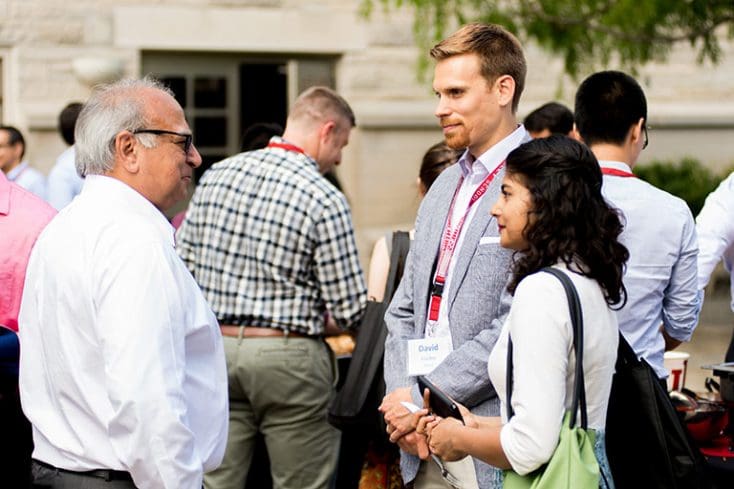 image credit: IU Kelley School of Business During an MBA admit weekend, gauge your comfort level with the current students. How do you feel about your potential future classmates? Did you develop a friendly rapport with any fellow attendees? Did you meet someone who could be a possible roommate if you are looking for one? While you’ll likely gravitate toward people with similar professional or cultural backgrounds at this type of event, take advantage of the fact that your possible future cohort is a highly diverse group. Meeting people outside of your comfort zone will significantly enrich your MBA admit weekend experience. Tip 2: Learn all you can about student life. You likely already conducted exhaustive research about your target schools during the application and interview phase. Now that you’re admitted bring on the questions! The MBA admit weekend is your chance to find out answers to all the lingering doubts in your mind. Ask tons of questions about clubs, classes, favorite professors, travel opportunities, and study abroad programs from current students who can fill in those remaining blanks.  image credit: UNC Kenan-Flagler Business School Think of questions in advance and do a bit of research so that you know if there’s someone you want to talk with, a meeting you want to set up, or a location you want to explore. Keep your interests and passions at the forefront of your mind during the visit. You want to make sure the school in question can satisfy your non-negotiable needs. This option is likely unavailable this year due to the pandemic, but we advise staying in student dorms during your visit if possible. Even if you have other housing plans, this is another valuable opportunity to meet current students and observe daily life on campus up close. Tip 3: Get an authentic sense of the city or region. Candidates often apply to business schools in geographic areas that are new to them. Think about where you want to end up working after graduation. Is the program in your desired city, or at least in the same overall region? Does it have a reputation for helping its students land jobs in the area you want to live? Use the MBA admit weekend to get a better feel for housing options, too. Explore the neighborhoods where students typically live. Make sure to ask questions that clarify anything you want to know before moving to a new city. 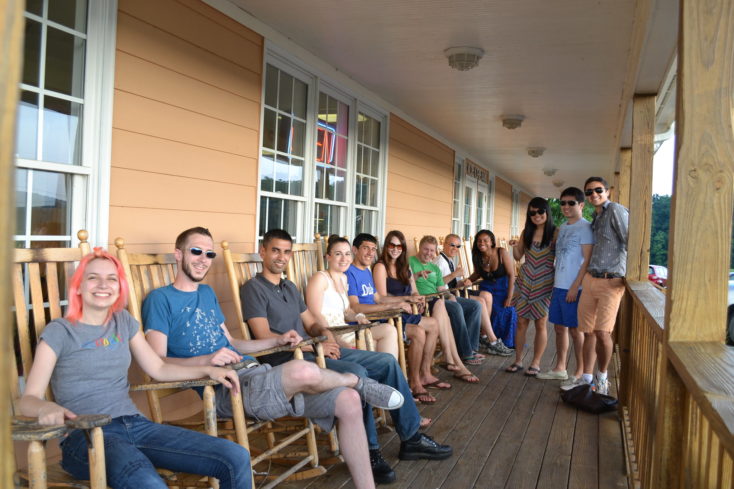 image credit: Fuqua School of Business If location isn’t a major concern, then focus on what does matter most to you. That might include recruitment stats for specific industries, the student body’s diversity, or international opportunities. While you likely reviewed this information when deciding where to apply, it warrants a closer look. For applicants attending admitted student days at more than one program, go with an open mind and be prepared to reflect on the experience afterward. The decision where to attend business school is personal, and every candidate has unique needs to fulfill. Another SBC client, admitted to HBS and the GSB, suggested attending both schools’ events and “Then flip a coin. See how the coin flip makes you feel and go with your gut.” If you have already accepted an offer and visited the campus before admission, still attend the welcome weekend event and experience the school again without the anxiety you felt as an applicant. Know that no matter what you decide, you will have a once-in-a-lifetime experience at a prestigious institution. Pick from the heart. Use the MBA admit weekend to make sure that you’ve found the right school for you. The post MBA Admit Weekend Tips appeared first on Stacy Blackman Consulting - MBA Admissions Consulting. |
| FROM Stacy Blackman Consulting Blog: B-Schooled Podcast Episode #50: 5 Paths Forward if You’ve Been Dinged Everywhere |
 While some MBA hopefuls are still waiting to hear the results of their Round 2 efforts and others who applied in Round 3 or were waitlisted still have their fates up in the air, the application process has unfortunately come to a disappointing end for some people. After working so hard on your MBA materials for months on end, it can be shocking and devastating if you are not accepted anywhere. What should you do now? This episode discusses 5 paths forward for MBA hopefuls who were dinged. Listen to B-Schooled episode #50 here, or on any of the podcast apps listed below. B-Schooled is available on most major podcast apps, including: Apple Podcasts Spotify Stitcher TuneIn Please be sure to subscribe to B-Schooled so that you don’t miss a thing. If there’s something you’d like for us to cover in a future episode, please email podcast@stacyblackman.com. We’d love to hear from you! The post B-Schooled Podcast Episode #50: 5 Paths Forward if You’ve Been Dinged Everywhere appeared first on Stacy Blackman Consulting - MBA Admissions Consulting. |
| FROM Stacy Blackman Consulting Blog: Improve Your MBA Candidacy Now for Fall Applications |
 If you plan to apply to business school in the upcoming admissions cycle, you may think it impossible to improve your MBA candidacy in such a short amount of time. Not true! You can take action in three critical areas right now that will pay dividends in the fall. Academic Enhancement Did you major in liberal arts? Is your undergrad GPA 3.2 or below? In both of these scenarios, you may want to consider taking quantitative classes to enhance your academic profile. When in doubt about your test scores’ strength, consult your target schools’ admitted student profile page and compare them to the median reported score. If you took the GMAT once or twice and did not receive the score you think you are capable of, consider taking a prep course to remind you how to solve those high school math logic problems. Retake the GMAT until you get the score you feel good about. Or, prove you have the quantitative chops by acing a college-level statistics, microeconomics, or calculus course at the local community college. For applicants who can’t raise their GMAT score enough, consider taking the GRE and see how the two scores stack up. Fortunately, most MBA admissions teams take a holistic view of an individual’s candidacy. Enthusiastic recommendation letters that also address the applicant’s quantitative skills will carry significant weight with the committee. Extracurricular Involvement A strong focus on work is fantastic. But it’s important to showcase other aspects of your personality, too. This helps prove that you bring a diverse set of skills to an MBA program. Community involvement demonstrates that you have a larger view of the world. Specifically, it shows you see what’s happening outside of your office and that you want to contribute. But what if you have no time for outside interests because of your 80-hour workweek? Many applicants share this dilemma. Nevertheless, you should still try to find ways to subtly up your community engagement in the coming months. It’s not about gaming the process with some newfound volunteering involvement, however. The best way to seamlessly incorporate extracurriculars is to think about longstanding passions and interests and build upon them. This is something you can do even with the lingering effects of the pandemic. (Check out our coronavirus MBA volunteering suggestions.)  Have you volunteered for a particular group before? Check in to see what else you can help them with that’s more high profile. Or ask if any open leadership roles would be a good fit. Don’t get hung up on traditional volunteer work, though. There are many ways to show your diversity that can improve your MBA candidacy. The key is to think hard about what excites you. Get creative and discover how you can leverage those interests for the greater good. Leadership Development Business schools want to see applicants with proven leadership skills that their MBA program can further develop. A promotion between now and the fall would be the ideal scenario. But you don’t have to wait for your supervisor to act to enhance your overall leadership and management potential for business school applications. Letting others know you want to develop your people skills further may uncover new opportunities to go above and beyond. Volunteer for that cross-functional team or project or offer to help your boss with a challenging long-term goal. Consider getting involved with employee groups at work—whether through volunteering in the community or promoting diversity in your company. All of these avenues can provide great material for your resume and essays.  To show leadership without clear career progression, look again to your extracurricular activities and think about taking on a leadership role. Can you find a way to lead with ideas, to show success because of your influence, communication skills, or ability to motivate people? This is your chance to demonstrate that you can run a project and motivate a team. The spring and summer months can be very fruitful for your personal and professional development. More precisely, it’s a great time to improve your MBA candidacy. With a little advanced planning and a commitment of just a few hours a week, applicants can do a great deal to enhance their profile before that final rush of the fall and winter. The post Improve Your MBA Candidacy Now for Fall Applications appeared first on Stacy Blackman Consulting - MBA Admissions Consulting. |
| FROM Stacy Blackman Consulting Blog: Avatars Can Make Zoom Meetings Bearable |
 “FRESH IDEAS FROM THE BLACKLIGHT” SBC’s Weekly Newsletter for Professionals It’s time to make peace with the fact that virtual meetings are with us for the long haul. Vaccines or no, many companies will continue to allow employees to work from home at least some of the time. Meaning, we’re going to be dealing with “Zoom fatigue” for the foreseeable future. That is, unless virtual reality (VR) technology such as avatars steps in to relieve us from the limitations of video calls. No longer relegated to the gaming industry, VR can help us reimagine how work gets done. “Virtual reality — and the use of avatars in particular — is spreading as an emerging management and communication tool in organizations,” says UV Darden Professor Roshni Raveendhran, who studies the future of work and the integration of novel technologies into the workplace. One reason video calls are so exhausting is that we have to focus more than we do during a face-to-face chat. On Zoom, everyone is staring at you for the entire meeting. We’re not comfortable with these long stretches of mutual gaze because it causes “non-verbal overload.” That’s why VR avatars could make our remote work interactions more bearable.  A handful of tech companies have created lifelike 3D avatars you can use instead of your face in meetings. Interacting with avatars requires less mental processing and thus reduces Zoom fatigue, Raveendhran explains. How Avatars Work Loom.ai, purchased by Roblox in December 2020, launched LoomieLive about a month into the COVID-19 pandemic. It lets you create a personalized, voice-driven avatar to use on any video conferencing service. As Refinery29 explains, While you speak, your avatar lip-syncs in real-time and looks straight into the camera, even when you don’t. You’re free to turn away from your screen, get out of your chair to stretch, or even leave the room — all while your avatar appears engaged in conversation, speaking your exact words. “As companies start thinking about making remote work a longer-term reality,” says Raveendhran, “one key challenge pertains to missing social connection, the feeling of being part of the same group. So, there will be a lot more demand for immersive technologies like VR. That’s why it’s important to understand the psychology that drives people to adopt some of those technologies.”  Raveendhran co-authored a recent study examining when and why leaders might prefer interacting with their subordinates via computer avatars rather than face-to-face. She learned that managers liked avatars because they allowed for more psychological distance than do face-to-face interactions. “We now know,” says Raveendhran, “that people can adopt VR technologies to psychologically buffer themselves from uncomfortable situations. And this distancing aspect can sometimes be as useful in the workplace as the immersive experiences that VR might offer.” VR technology for the office environment is still in its infancy. Yet, its transformation over the next decade will be profound. For now, when Zoom calls, we’ll happily switch over to let our avatars do the talking. *** Did you like this post about VR technology? It originally appeared on the Blacklight, our weekly newsletter for professionals. At the Blacklight, we aim to illuminate with every dispatch that lands in your inbox. If you’re thirsty for guidance to help you slay it at work or as a student and move your goalposts closer, sign up today! The post Avatars Can Make Zoom Meetings Bearable appeared first on Stacy Blackman Consulting - MBA Admissions Consulting. |
| FROM Stacy Blackman Consulting Blog: B-Schooled Podcast Episode 51: Who Should Work with an MBA Admissions Consultant? |
 While the team here at Stacy Blackman Consulting is confident that we can help strengthen the materials of absolutely any MBA hopeful who works with us, we honestly don’t believe that all MBA applicants need help. However, over the past two decades, nine types of MBA applicants who would benefit greatly from our services have clearly emerged. This episode focuses on those buckets and how specifically an admissions consultant might be of value. Listen to B-Schooled episode #51 here, or on any of the podcast apps listed below. B-Schooled is available on most major podcast apps, including: Apple Podcasts Spotify Stitcher TuneIn Please be sure to subscribe to B-Schooled so that you don’t miss a thing. If there’s something you’d like for us to cover in a future episode, please email podcast@stacyblackman.com. We’d love to hear from you! The post B-Schooled Podcast Episode 51: Who Should Work with an MBA Admissions Consultant? appeared first on Stacy Blackman Consulting - MBA Admissions Consulting. |
| FROM Stacy Blackman Consulting Blog: Know When to Retake the GMAT |
 Occasionally, we hear tales of MBA applicants offered admission in a top business school with a 640 GMAT score. But in truth, accepting students with scores of 700+ is more the norm at the most competitive programs. So, should you automatically retake the GMAT if you don’t hit 700? Before you start to panic and become hung up on achieving the highest score possible or fixate on the average GMAT score reported by the schools, we urge test-challenged clients to focus instead on aligning their scores within the 80 percent range. Schools usually list this information within their admitted class profile. Many experts in the test prep industry advise all students to plan on taking the test twice. If you score at or above your goal on the first try, you can always cancel the second sitting. Remember, top schools want to see scores in the 80th percentile in the quantitative section. So if you score 100 percent in verbal and low in quantitative, you would want to retake the GMAT exam. This holds, especially if you don’t have a strong quantitative background outside of the GMAT. What’s a “good enough” score? There is absolutely no reason to retake the GMAT when you score over 700. You’ve already proven you can handle the quantitative component of the curriculum. Now turn your focus toward ensuring all of the other parts of your application are as strong as possible. Keep in mind that this high number is primarily for those targeting a top-tier MBA program. If you scored a 680, the decision to retake should be carefully considered. You may be better off focusing on your essays or coaching recommenders instead. Applicants looking at programs in the top 20 or 50 should check the average scores of admitted students to determine their personal target GMAT score. If illness, nerves, exhaustion, or simply a lack of adequate preparation resulted in a low score, then a second attempt becomes necessary. Repeat test-taking, with additional preparation, typically results in a higher score as students become familiar with the experience, and therefore, less stressed out.  The Graduate Management Admission Council allows you to retake the GMAT as many times as you like. Make sure to check your target schools’ deadlines to allow enough time to send in your final scores. AdCom has no problem if you retake the GMAT Applicants self-report their highest score, and it’s worth noting that the admissions committee has no issue with students taking the exam more than once. In fact, committees may look positively at the dedication you’ve shown to improve upon your prior performance. Lisa, a former MBA Admissions Officer on our SBC team shares, “It shows perseverance, self-awareness, and judgment; schools generally don’t hold it against you that you take a test multiple times and use the score report you indicate in your application.” To be clear, we’re talking about a score report with two or three scores, max—not one that shows you’ve sat for the GMAT seven times. After your first test, it’s time to reflect on your entire GMAT performance. Determine your weaknesses, and double down in those areas as you resume your studies. Don’t completely ignore the sections you did well on, however. You wouldn’t want to improve in one area but do worse in another the next time. If you studied alone or took a class for your initial preparation, consider studying with a GMAT tutor for the second go-round. A test prep expert can work around your schedule and tailor the curriculum to your needs. 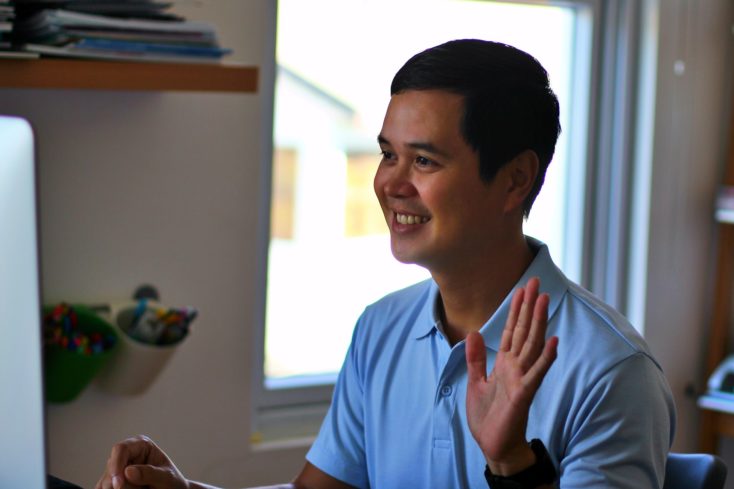 Advice for applicants with test-taking anxiety Finally, some people aren’t natural test-takers and have a less-than-optimal performance no matter how well they know the material. One of the primary causes is stress under pressure. If you’re taking the test in person, it may help to watch this video tour of the GMAT Test Center and detailed explanation of all procedures to increase your comfort level about what to expect. If that familiarity still isn’t enough to calm your nerves come test day, consider using relaxation techniques such as meditation and visualization to reduce test anxiety. Also, try to retake the GMAT in the same center will help you feel more comfortable. Business school hopefuls can be incredibly hard on themselves when they make mistakes on the GMAT, but each error is a learning opportunity and a chance to improve. So don’t become discouraged if your first score isn’t where you’d hoped. Relax, and think of it as a dress rehearsal for a stellar performance to come. Image via ink media The post Know When to Retake the GMAT appeared first on Stacy Blackman Consulting - MBA Admissions Consulting. |
| FROM Stacy Blackman Consulting Blog: Comparing Top EU MBA Programs Vs. Top US Programs |
 INSEAD in France, London Business School, Oxford’s Saïd Business School, and Cambridge’s Judge Business School are among the top EU MBA programs. While INSEAD and LBS rank highest, HEC Paris, Italy’s SDA Bocconi, and Spain’s IESE shine in their home markets. There are several factors to consider while weighing whether an MBA in Europe will help you reach your career goals. From cost to duration to brand reputation and more, keep the following in mind as you make your decision. Cost and ROI for Top EU MBA Programs  First, these programs boast a high return on investment (ROI), as most last just one year. For example, you can complete an MBA program at INSEAD in as little as ten months. Compared to a two-year or US MBA program, lower tuition and opportunity costs look enticing. But even for the longer EU MBA programs, such as London Business School and IESE Business School in Spain, tuition fees are lower. In a survey of SBC’s EU applicant pool, 48% cited reasons such as shorter duration and lower tuition costs. Global Experience Secondly, EU MBA programs are more global in nature, compared to even the most “global” US program. They attract students who want a truly international experience with their education. They also attract professionals planning to work in Europe after their studies. We consider an MBA in Europe an excellent complement to an undergraduate degree earned in the US. It positions students for global careers better than doing both college and an MBA in the same country or continent.  If your professional goal is to live and work in Europe, pursuing an MBA abroad is arguably the best introduction to local business life. Keep this fact in mind: INSEAD, LBS, and HEC Paris place less than 10% of graduates into US-based employment roles. Meanwhile, they place 50-to-66% of grads in Europe. Niche Work Opportunities The new two-year, post-study work visa, which returns to the UK for international students graduating in summer 2021 or later, will make it easier for new MBAs to find jobs—and for employers to hire them. MBA hopefuls may also favor specialized industry recruiting where the EU has the edge over the US. While the US is the technology industry hub (tech is still a nascent market in the EU), Europe dominates the fintech industry. London is considered the fintech capital of the world because of the banking passport legislation that governs Europe and standardizes products across the 27 member countries. Europe has an advantage over the US in the fintech industry because the US must contend with legislation that varies by state and can be an impediment to digital banking. Less Competitive Admissions For some MBA applicants, the relative competitiveness of the schools is another factor. We have seen better admissions odds for top EU programs relative to the M7 top US programs for a typical applicant. We had a recent inquiry who experienced rejection from every top US program to which she applied but got accepted to LBS. Generally, EU schools are more open to having larger percentages of international students, particularly from Commonwealth countries (e.g., India). Meanwhile, US schools are more competitive for those with overrepresented backgrounds in the applicant pool.  Why Choose a top US MBA program over a top EU program? Reputation matters. Top schools such as Harvard, Stanford, Wharton, and others are in demand because top employers source their talent from these student pools. This is especially critical for students wishing to make an industry and/or functional pivot post-MBA. Career potential is the key advantage that US MBA programs have over European (EU) schools. Applicants highly favor top US MBA programs across the career-related attributes of reputation, recruiting, and networking as compared to EU programs. In a survey of the SBC client pool, applicants reported as follows: 75% said reputation is stronger for US MBA programs than non-US MBA programs 62% said US programs will accelerate their career path 54% said US programs have strong professional networks 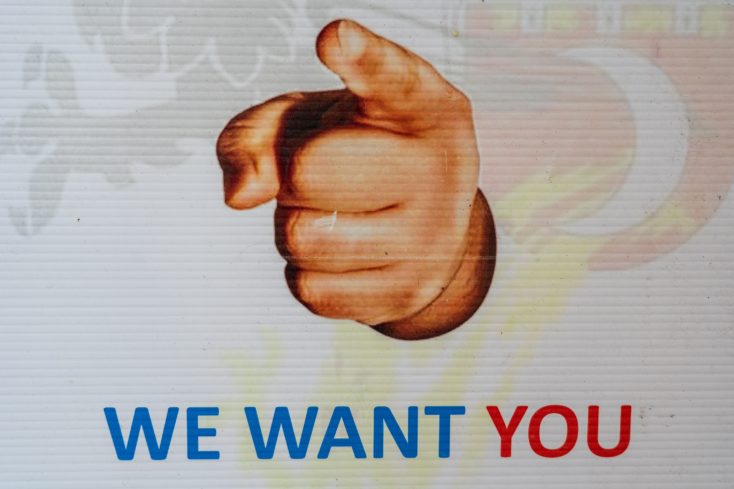 Access to US employers is a key advantage of top US MBA programs for international applicants. One client shared, “I would like to change markets and go to the States. But it’s difficult coming from a German undergrad.” Industry switchers also favor the US MBA program. As one respondent commented: “Coming from a non-business background, I am looking for two-year MBA programs versus the European one-year MBA.” Many consider the depth of coursework and intellectual rigor better in a two-year, top US program. As one of our clients echoed, “case-based and experiential pedagogies that are popular across US schools is why I’m applying instead of my local EU programs.” And, for many US-based applicants, it’s merely a matter of logistics. A client said, “Travel costs would be prohibitive for an international program; I wouldn’t like to travel overseas away from family for an extended period.” How to decide: US or EU  Differences between US and EU programs also include the composition of the student class and geographical outplacement profiles. Do you want a student class that is US or international dominant? If your preference is fewer US students (10%) and a dominant (90%) international student class, programs in the EU such as INSEAD, LBS and HEC Paris are excellent choices. If you favor a US peer group with around 30% international students, US MBA programs are your best fit. Next, think about where you want to live upon graduation. INSEAD, LBS, and HEC Paris place under 10% into US-based employment roles and many more, at 50-to-66%, into Europe. If you prefer to work in the US, the US MBA programs dominate with 87-to-89% outplacement to the US. Europe or the US? Wherever your career path leads, an MBA will help. The post Comparing Top EU MBA Programs Vs. Top US Programs appeared first on Stacy Blackman Consulting - MBA Admissions Consulting. |
| FROM Stacy Blackman Consulting Blog: MBA Reapplication Advice |
 Every year, even highly qualified applicants get rejected from the top-ranked MBA programs. With the pandemic-induced economic downturn, the 2020-21 application season was particularly competitive. If you were not successful in gaining admission this year, it’s important to first spend some time on self-reflection. Then seek feedback from multiple sources, and finally, work to improve your profile before beginning your MBA reapplication process in the fall. Above all else, remember that admissions committees want to see substantial improvement from reapplicants. To be successful next season, it’s important to come up with a strategy before reapplying.  Evaluate your Applications Before seeking feedback from others, it’s important to do your own soul searching. Ask yourself whether you could have improved any aspect of the process: School Selection: How do you feel about the competitiveness of the schools you applied to? Would you consider expanding the list of schools and including a few less competitive programs? Volunteering: Did your volunteer activities lack depth or breadth? Could you seek out a leadership role in your volunteer activities? Academics: Is there room for improvement in your GMAT score? Would you have taken a business-related class before applying if you had more time? Recommendations: Do you suspect that one of your recommenders gave a lukewarm letter of support? Do you think you could have chosen someone to represent a different side of your personality or profile? Time Spent: Do you think your essays represented your best work? Did you have the time to go through multiple iterations of your essays? Did you rush through the process of filling out the online application? Once you have identified a few areas of improvement for next year on your own, it’s important to seek feedback from a variety of sources.  Seeking Feedback Due to the high application volume at top MBA programs, most schools cannot provide comprehensive feedback to rejected applicants. However, if you do have a chance to speak with a member of the admissions committee, take advantage by asking for details about each area of your application and listen with an open mind. Make sure you walk away from any feedback session with action items for next year. If you don’t receive feedback directly from the schools, seek advice from friends and family who have experience with MBA programs. Stacy Blackman Consulting also offers a Ding Analysisservice to evaluate your materials and provide feedback you can use when you reapply. Improving Your Profile is Vital to the MBA Reapplication Process Once you have done some soul-searching, evaluated your previous attempt, and spoken to others about steps you can take now to improve your application in the fall, it’s time to get started. Before essay questions come out in the summer you have time to take a GMAT prep course, take a class at a local community college, ask for a leadership opportunity at work or in a volunteer setting, and cultivate a relationship with a potential recommender. Take advantage of the time available now, and approach the process strategically. Good luck! The post MBA Reapplication Advice appeared first on Stacy Blackman Consulting - MBA Admissions Consulting. |
| FROM Stacy Blackman Consulting Blog: B-Schooled Podcast Episode 52: Secrets of Dual HBS/GSB Admits, Part 1 of 2 |
 The MBA admissions process can often be brutal. The competition to get into highly ranked programs is especially cutthroat, which makes it all the more impressive when a candidate gains admission to not one, but two of the top programs in the world: Harvard Business School and Stanford Graduate School of Business. Stacy Blackman Consulting studied the dual admits we worked with a few years ago, and then again this past year, in order to analyze their secrets to success as well as assess trends over time. This episode focuses on the first four of the eight themes we discovered, and an upcoming episode will cover the final four themes. Listen to B-Schooled episode #52 here, or on any of the podcast apps listed below. B-Schooled is available on most major podcast apps, including: Apple Podcasts Spotify Stitcher TuneIn Please be sure to subscribe to B-Schooled so that you don’t miss a thing. If there’s something you’d like for us to cover in a future episode, please email podcast@stacyblackman.com. We’d love to hear from you! The post B-Schooled Podcast Episode 52: Secrets of Dual HBS/GSB Admits, Part 1 of 2 appeared first on Stacy Blackman Consulting - MBA Admissions Consulting. |

|
|